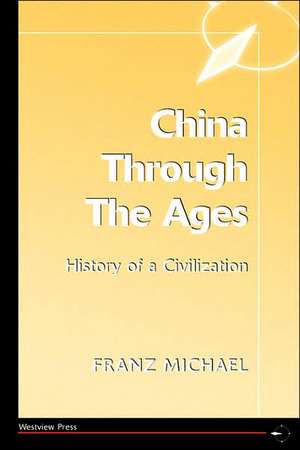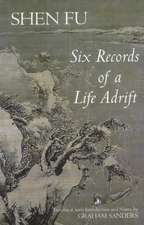China Through The Ages: History Of A Civilization
Autor Franz Michaelen Limba Engleză Paperback – 28 oct 1986
Past studies of China have concentrated on specific events or have related a chronological history of the dynastic periods. Although they have included aspects of cultural history, these works have underemphasized the country's great social, political, and intellectual movements and their ultimate expression in the art and literature of the time. By focusing on these themes, Professor Michael provides a new framework for understanding the Chinese cultural tradition.The author describes the evolving history of ideas in China, from ancient faith in powerful magic to more modern concepts of a logical moral order of the universe and mankind's place in it. He also explores the intellectual ferment following the dawn of the age of reason, the integration of Buddhism into the Confucian social order, and the social transformations accompanying the rise and fall of the centralized state. Throughout, he illustrates how the changing society's beliefs, values, and aesthetic sense were embodied in its art and literature. This portrayal of the Chinese cultural tradition not only puts Chinese history in a new perspective, it illuminates the process through which China constructed a modern society from a non-Western foundation and serves as an essential tool for understanding modern-day China and its prospects for the future.
| Toate formatele și edițiile | Preț | Express |
|---|---|---|
| Paperback (2) | 159.90 lei 6-8 săpt. | |
| Avalon Publishing – 28 oct 1986 | 159.90 lei 6-8 săpt. | |
| Taylor & Francis – 7 dec 2020 | 388.64 lei 6-8 săpt. | |
| Hardback (1) | 770.45 lei 6-8 săpt. | |
| Taylor & Francis – 7 iun 2019 | 770.45 lei 6-8 săpt. |
Preț: 159.90 lei
Preț vechi: 238.41 lei
-33% Nou
Puncte Express: 240
Preț estimativ în valută:
30.60€ • 31.83$ • 25.65£
30.60€ • 31.83$ • 25.65£
Carte tipărită la comandă
Livrare economică 14-28 martie
Preluare comenzi: 021 569.72.76
Specificații
ISBN-13: 9780865317260
ISBN-10: 0865317267
Pagini: 278
Dimensiuni: 152 x 229 mm
Greutate: 0.45 kg
Editura: Avalon Publishing
Colecția Westview Press
ISBN-10: 0865317267
Pagini: 278
Dimensiuni: 152 x 229 mm
Greutate: 0.45 kg
Editura: Avalon Publishing
Colecția Westview Press
Notă biografică
Franz Michael is professor emeritus at George Washington University, where he was associate director and director of the Institute for Sino-Soviet Studies from 1964 to 1972. Dr. Michael's publications include Rule by Incarnation: Tibetan Buddhism and Its Role in Society and State (Westview).
Cuprins
1. Beginnings: The Geographical Setting 2. The Age of Magic: Legend and Archaeology 3. The Age of Magic: The Shang Dynasty 4. The Age of Reason: The Chou Dynasty 5. Intellectual Revolution: A Hundred Schools of Thought 6. The Unified Empire 7. The Empire Consolidated: The Han Dynasty 8. The Coming of Buddhism 9. Reunification: The Sui and T'ang Dynasties 10. A Chinese Renaissance: The Sung Dynasty 11. The Mongol Empire 12. Chinese Restoration: The Ming Dynasty 13. The Last of the Imperial Order: The Manchu or Ch'ing Dynasty 14. From Empire to Nation, State: The Great Rebellion, Reform, and Revolution 15. The Nationalists 16. Communism Under Mao 17. The Post-Mao Experiment 18. Conclusion
Descriere
Descriere de la o altă ediție sau format:
Past studies of China have concentrated on specific events or have related a chronological history of the dynastic periods. These works have included aspects of cultural history but have underemphasized the country's great social, political, and intellectual movements and their ultimate expression in the art and literature of the time. By focusing on such themes, Professor Michael provides a new framework for understanding the Chinese cultural tradition. The author describes the evolving history of ideas in China, from ancient faith in powerful magic to more modern concepts of a logical moral order of the universe and mankind's place in it. He also explores the intellectual ferment following the dawn of the age of reason, the integration of Buddhism into the Confucian social order, and the social transformations accompanying the rise and fall of the centralized state. Throughout, he illustrates how the changing society's beliefs, values, and aesthetic sense were embodied in its art and literature. This portrayal of the Chinese cultural tradition not only puts Chinese history in a new perspective, it also illuminates the process through which China constructed a modern society from a non-Western foundation and serves as an essential tool for understanding modern-day China and its prospects for the future.
Past studies of China have concentrated on specific events or have related a chronological history of the dynastic periods. These works have included aspects of cultural history but have underemphasized the country's great social, political, and intellectual movements and their ultimate expression in the art and literature of the time. By focusing on such themes, Professor Michael provides a new framework for understanding the Chinese cultural tradition. The author describes the evolving history of ideas in China, from ancient faith in powerful magic to more modern concepts of a logical moral order of the universe and mankind's place in it. He also explores the intellectual ferment following the dawn of the age of reason, the integration of Buddhism into the Confucian social order, and the social transformations accompanying the rise and fall of the centralized state. Throughout, he illustrates how the changing society's beliefs, values, and aesthetic sense were embodied in its art and literature. This portrayal of the Chinese cultural tradition not only puts Chinese history in a new perspective, it also illuminates the process through which China constructed a modern society from a non-Western foundation and serves as an essential tool for understanding modern-day China and its prospects for the future.










